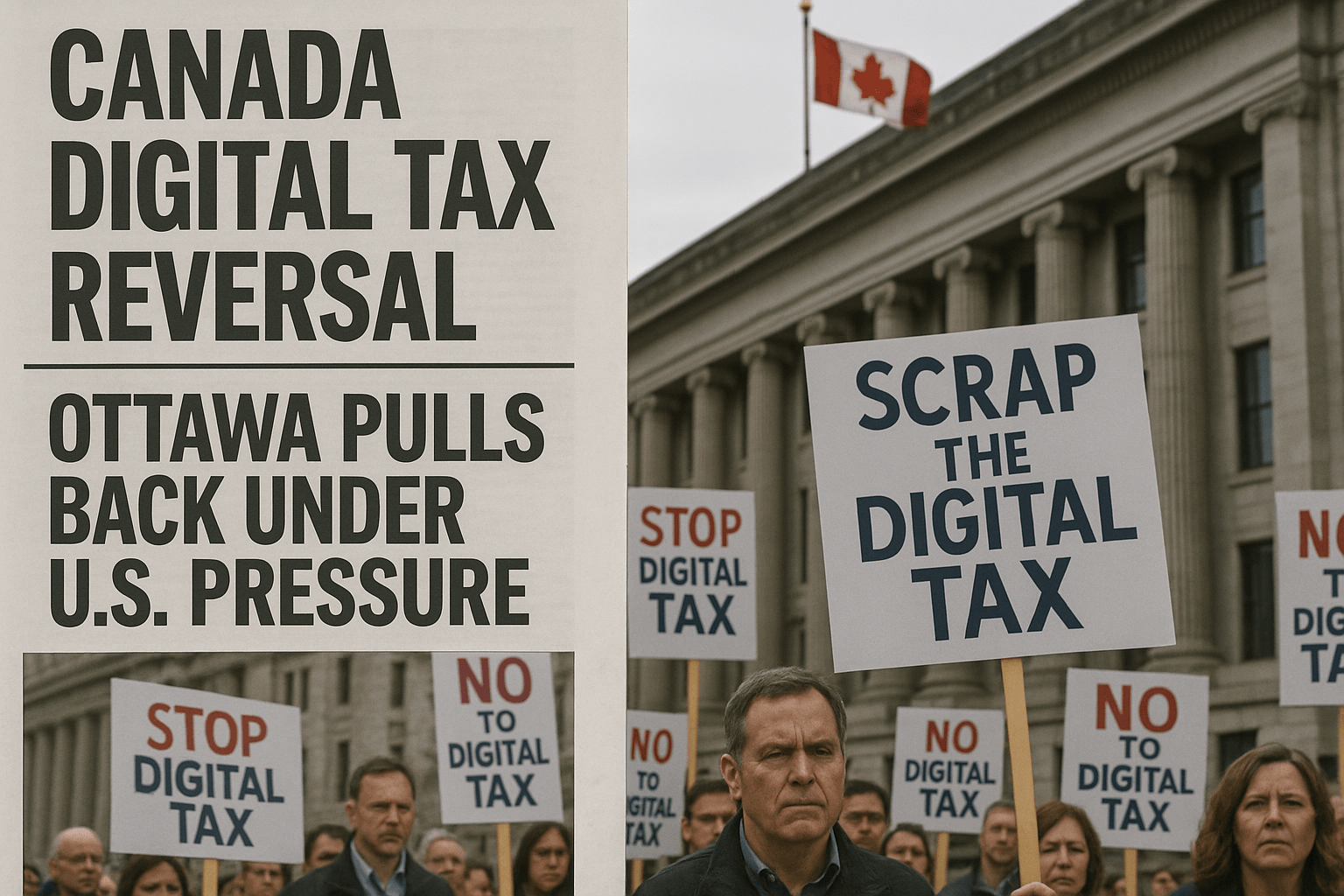|
Getting your Trinity Audio player ready... |
In a stunning about-face, the Canadian government has officially withdrawn its highly controversial digital services tax (DST) — a move that signals a significant diplomatic shift and a bid to defuse rising trade tensions with the United States. Originally set to go into effect this month, the 3% tax targeted global tech giants generating over €750 million globally and at least $20 million annually from Canadian digital users. The tax was retroactive to 2022 and projected to raise C$7.2 billion over five years.
But after months of escalating threats from the White House and growing industry backlash, Ottawa has opted for a Canada digital tax reversal, halting implementation just days before the collection deadline.
“This Is a Strategic Recalibration,” Says Finance Minister

Canadian Finance Minister François‑Philippe Champagne confirmed the reversal in a press conference, stating the decision “opens the door to constructive trade talks and a long-term bilateral economic framework.”
The repeal follows a turbulent diplomatic standoff. President Trump had blasted the tax as “a blatant attack on American innovation,” pausing trade talks and threatening retaliatory tariffs under Section 301 of the U.S. Trade Act.
“This was not a negotiation. It was a warning,” said one senior U.S. official. “Canada understood the stakes.”
Trade Talks Resume, but Tariff Threats Loom
The U.S. administration welcomed the decision and immediately confirmed that previously stalled trade negotiations with Canada would resume.
White House economic adviser Kevin Hassett noted the reversal “clears a major roadblock in North American trade relations.” Canadian Prime Minister Mark Carney echoed the sentiment, saying discussions are already underway to finalize a broader economic-security accord before the July 21 deadline set at last month’s G7 Summit.
Still, the pressure remains. The U.S. continues to impose punishing tariffs — 25% on general imports and 50% on Canadian steel and aluminum. President Trump warned that further retaliatory measures could be levied against Canadian industries if a deal is not struck by July 9.
Tech Industry Breathes a Sigh of Relief: Canada digital tax reversal
The Canada digital tax reversal delivers an enormous win for Silicon Valley powerhouses like Google, Meta, Amazon, and Airbnb. Analysts estimate that, excluding avoided compliance expenses, the repeal may save U.S. tech companies between $2 and $3 billion in retroactive and ongoing tax bills.
The action “protects American jobs, innovation, and consumers,” according to the Computer & Communications Industry Association (CCIA), which hailed the decision. According to earlier industry estimates, if the DST had been implemented, losses may have reached $2.3 billion a year.
“This decision is a testament to how diplomacy and economic leverage can reshape policy — even across borders,” said Amanda Blake, senior trade analyst at Brookings.
Canada Refocuses on Global Digital Tax Talks

The DST had been Canada’s interim solution while awaiting an OECD-led international framework on digital taxation. With its unilateral approach now shelved, Ottawa is doubling down on support for the OECD’s Pillar One initiative, which seeks a multilateral agreement on taxing global tech companies based on profit allocation.
Critics argue that Canada’s retreat sets a dangerous precedent — bending under foreign pressure and signaling weakness. But supporters call it a pragmatic move to preserve national economic interests and protect cross-border trade.
“This isn’t surrender,” said Minister Champagne. “It’s strategic diplomacy.”
What This Means Going Forward: Canada digital tax reversal
- Tech companies save billions by avoiding additional taxes and compliance requirements.
- Canada avoids retaliatory tariffs that could damage its manufacturing and export sectors.
- Trade negotiations are back on, with a July 21 deadline to reach a final deal.
- Canada is re-aligning with multilateral allies as the global debate over digital taxes heats up.







